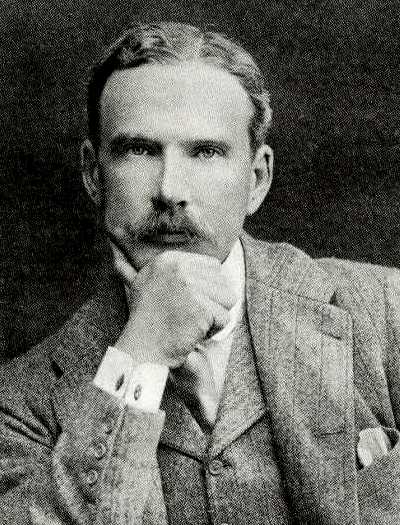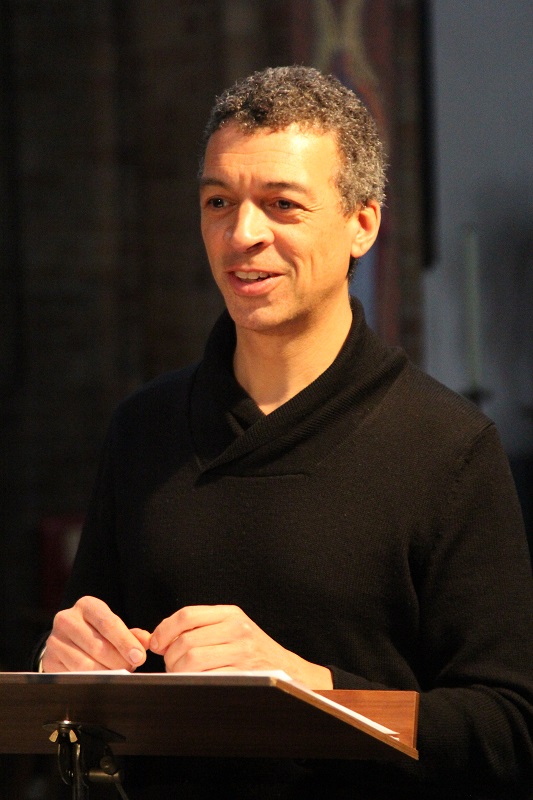Pianist Christopher Glynn on Schubert in English: 'this new translation never walks on stilts' | reviews, news & interviews
Pianist Christopher Glynn on Schubert in English: 'this new translation never walks on stilts'
Pianist Christopher Glynn on Schubert in English: 'this new translation never walks on stilts'
On working with Roderick Williams and Jeremy Sams on 'Winter Journey'
The idea for a new translation of Schubert's Winterreise came from an old recording. Harry Plunket Greene was nearly 70 (and nearly voiceless) when he entered the studio in 1934 and sang "Der Leiermann," the final song of the cycle, in English (as "The Hurdy-Gurdy Man") into a closely-placed microphone.
There’s a disarming directness to this singing – and it seems inextricably bound up with that fact that Plunket Greene chooses to sing in his native language. Like many singers of his pre-war generation, he often sang Lieder in translation, perhaps because communicating in the audience’s own language was thought to be as important as fidelity (or another kind of fidelity) to the composer’s original intentions.
 For later generations of singers, no doubt influenced by the legacy of German-speaking artists like Dietrich Fischer-Dieskau and Elisabeth Schwarzkopf, it became an article of faith that Lieder should always be sung in the original language. But returning again and again to Plunket Greene’s "Leiermann," (the Irish baritone pictured left in younger days) I wondered whether a translation could help unlock the cycle for new listeners. Because even in the classical music world, song recitals are rarer than they might be – a niche within a niche – and I know from my own experience as a festival director that only a subset of the audience can be persuaded to listen to a whole evening of songs in a foreign language. What would it be like to hear Winterreise sung in modern English? Could it help new listeners (and singers) get to know Schubert’s traveller, just as Plunket Greene did?
For later generations of singers, no doubt influenced by the legacy of German-speaking artists like Dietrich Fischer-Dieskau and Elisabeth Schwarzkopf, it became an article of faith that Lieder should always be sung in the original language. But returning again and again to Plunket Greene’s "Leiermann," (the Irish baritone pictured left in younger days) I wondered whether a translation could help unlock the cycle for new listeners. Because even in the classical music world, song recitals are rarer than they might be – a niche within a niche – and I know from my own experience as a festival director that only a subset of the audience can be persuaded to listen to a whole evening of songs in a foreign language. What would it be like to hear Winterreise sung in modern English? Could it help new listeners (and singers) get to know Schubert’s traveller, just as Plunket Greene did?
After a few fumbling attempts at translating the songs myself, I soon gave up and asked Jeremy Sams, wordsmith and polymath extraordinaire, if he’d take on the challenge. As the son of the great Lieder expert, Eric Sams, Jeremy has these songs in his blood and knows them intimately, but also shares my enthusiasm for bringing them to a wider audience. As the first drafts began to arrive over email - wonderfully lyrical and direct – it was clear that Jeremy’s winter traveller would speak the language of Everyman, echoing the "naturalness, truth and simplicity" to which Wilhelm Müller thought all poetry should aspire. My favourite thing about this new translation is that it never walks on stilts.
It’s true, though, that translation always involves elements of compromise. Jeremy himself describes the process as ‘a devilish game of four dimensional chess’ and no-one should underestimate how difficult it is. But isn’t there perhaps a compromise when songs are heard in a foreign language too? We tend to be faced with a choice between giving half our attention to the translation in the programme (thereby missing much of the expression that comes through a singer’s face and body language) or engaging fully with the performance but perhaps missing some of its meaning. And even those who understand the German words will never have the same emotional response to them as they do to their mother tongue.

After one such performance in Hull, Roderick had the idea of taking Winter Journey on nationwide schools tour – exactly the kind of project I’d hoped the new translation would enable, and one to which I readily agreed. So we’ve set aside three weeks next year to perform it to (and with) secondary school students all over the country – a sort of Schubert roadshow. We want them to feel this is their music - that Schubert belongs to them every bit as much as Ed Sheeran does. Another project in the pipeline will involve imagining what happens after that strange meeting in "Der Leiermann" between Schubert’s traveller and the hurdy-gurdy-playing beggar.
I’ve come to think of song translation as something like a film adaptation of a classic novel. Not a replacement for the original but a homage to it, faithful to the spirit if not always the letter, and with the possibility of reaching a broader public. It can be a stepping-stone to the original, or just enjoyed in its own right. Perhaps all the best translations are about the joy of discovery?
Not everyone will like it. For some, quite understandably, the original marriage of words and music is sacrosanct; whilst for others, not knowing exactly what is happening just adds to the mystery, or allows them to imagine their own stories into the music. Nothing wrong with that. But perhaps there is also room for a vernacular Winter Journey that offers the chance to experience meaning and music together, with something of the same immediacy that the composer surely intended when he sat down at the piano in 1827 and first shared the cycle with a group of his closest friends. Song is, after all, the conjunction of sound and sense; so Jeremy, Roddy and I hope that, for at least some listeners, Winterreise will be found in translation.
Explore topics
Share this article
The future of Arts Journalism
You can stop theartsdesk.com closing!
We urgently need financing to survive. Our fundraising drive has thus far raised £49,000 but we need to reach £100,000 or we will be forced to close. Please contribute here: https://gofund.me/c3f6033d
And if you can forward this information to anyone who might assist, we’d be grateful.

Subscribe to theartsdesk.com
Thank you for continuing to read our work on theartsdesk.com. For unlimited access to every article in its entirety, including our archive of more than 15,000 pieces, we're asking for £5 per month or £40 per year. We feel it's a very good deal, and hope you do too.
To take a subscription now simply click here.
And if you're looking for that extra gift for a friend or family member, why not treat them to a theartsdesk.com gift subscription?
more Classical music
 BBC Proms: Barruk, Norwegian Chamber Orchestra, Kuusisto review - vague incantations, precise laments
First-half mix of Sámi songs and string things falters, but Shostakovich scours the soul
BBC Proms: Barruk, Norwegian Chamber Orchestra, Kuusisto review - vague incantations, precise laments
First-half mix of Sámi songs and string things falters, but Shostakovich scours the soul
 BBC Proms: Alexander’s Feast, Irish Baroque Orchestra, Whelan review - rapturous Handel fills the space
Pure joy, with a touch of introspection, from a great ensemble and three superb soloists
BBC Proms: Alexander’s Feast, Irish Baroque Orchestra, Whelan review - rapturous Handel fills the space
Pure joy, with a touch of introspection, from a great ensemble and three superb soloists
 BBC Proms: Moore, LSO, Bancroft review - the freshness of morning wind and brass
English concert band music...and an outlier
BBC Proms: Moore, LSO, Bancroft review - the freshness of morning wind and brass
English concert band music...and an outlier
 Willis-Sørensen, Ukrainian Freedom Orchestra, Wilson, Cadogan Hall review - romantic resilience
Passion, and polish, from Kyiv's musical warriors
Willis-Sørensen, Ukrainian Freedom Orchestra, Wilson, Cadogan Hall review - romantic resilience
Passion, and polish, from Kyiv's musical warriors
 BBC Proms: Faust, Gewandhausorchester Leipzig, Nelsons review - grace, then grandeur
A great fiddler lightens a dense orchestral palette
BBC Proms: Faust, Gewandhausorchester Leipzig, Nelsons review - grace, then grandeur
A great fiddler lightens a dense orchestral palette
 BBC Proms: Jansen, Royal Concertgebouw Orchestra, Mäkelä review - confirming a phenomenon
Second Prom of a great orchestra and chief conductor in waiting never puts a foot wrong
BBC Proms: Jansen, Royal Concertgebouw Orchestra, Mäkelä review - confirming a phenomenon
Second Prom of a great orchestra and chief conductor in waiting never puts a foot wrong
 BBC Proms: Royal Concertgebouw Orchestra, Mäkelä review - defiantly introverted Mahler 5 gives food for thought
Chief Conductor in Waiting has supple, nuanced chemistry with a great orchestra
BBC Proms: Royal Concertgebouw Orchestra, Mäkelä review - defiantly introverted Mahler 5 gives food for thought
Chief Conductor in Waiting has supple, nuanced chemistry with a great orchestra
 Dunedin Consort, Butt / D’Angelo, Muñoz, Edinburgh International Festival 2025 review - tedious Handel, directionless song recital
Ho-hum 'comic' cantata, and a song recital needing more than a beautiful voice
Dunedin Consort, Butt / D’Angelo, Muñoz, Edinburgh International Festival 2025 review - tedious Handel, directionless song recital
Ho-hum 'comic' cantata, and a song recital needing more than a beautiful voice
 Classical CDs: Dungeons, microtones and psychic distress
This year's big anniversary celebrated with a pair of boxes, plus clarinets, pianos and sacred music
Classical CDs: Dungeons, microtones and psychic distress
This year's big anniversary celebrated with a pair of boxes, plus clarinets, pianos and sacred music
 BBC Proms: Liu, Philharmonia, Rouvali review - fine-tuned Tchaikovsky epic
Sounds perfectly finessed in a colourful cornucopia
BBC Proms: Liu, Philharmonia, Rouvali review - fine-tuned Tchaikovsky epic
Sounds perfectly finessed in a colourful cornucopia
 BBC Proms: Suor Angelica, LSO, Pappano review - earthly passion, heavenly grief
A Sister to remember blesses Puccini's convent tragedy
BBC Proms: Suor Angelica, LSO, Pappano review - earthly passion, heavenly grief
A Sister to remember blesses Puccini's convent tragedy
 BBC Proms: A Mass of Life, BBCSO, Elder review - a subtle guide to Delius's Nietzschean masterpiece
Mark Elder held back from blasting the audience with a wall of sound
BBC Proms: A Mass of Life, BBCSO, Elder review - a subtle guide to Delius's Nietzschean masterpiece
Mark Elder held back from blasting the audience with a wall of sound

Add comment